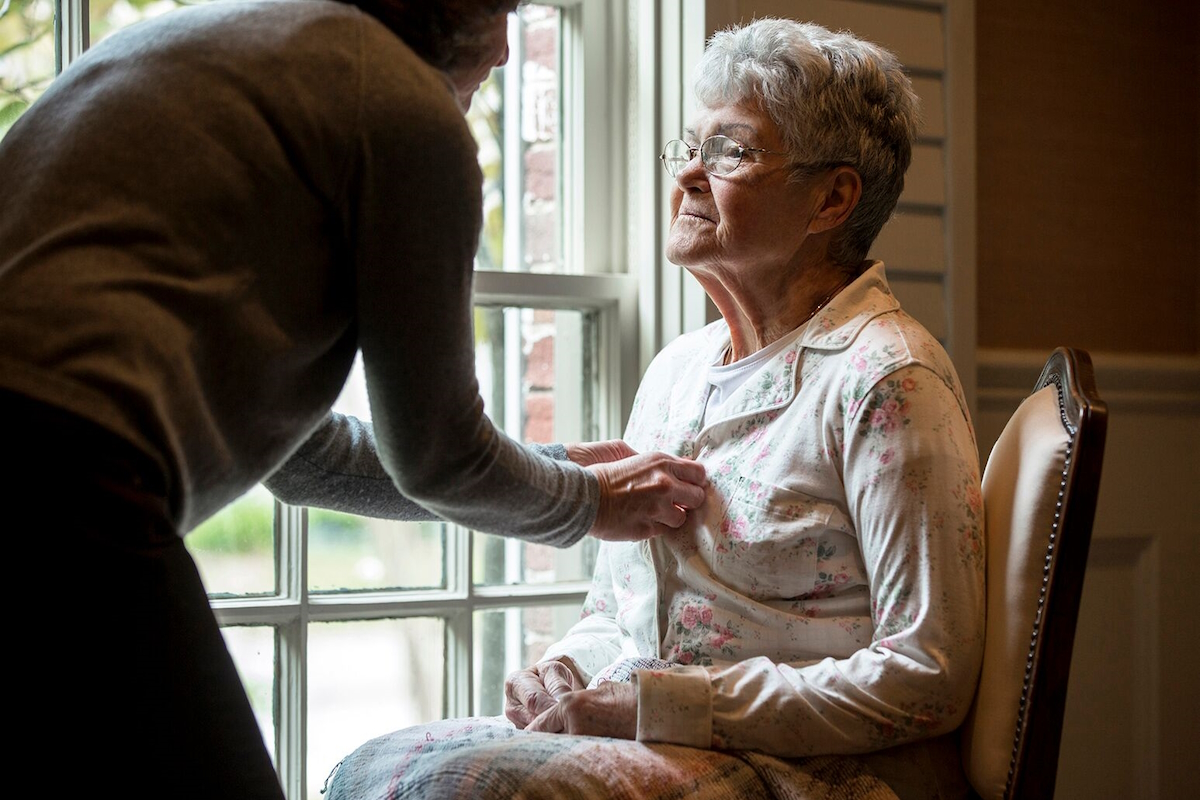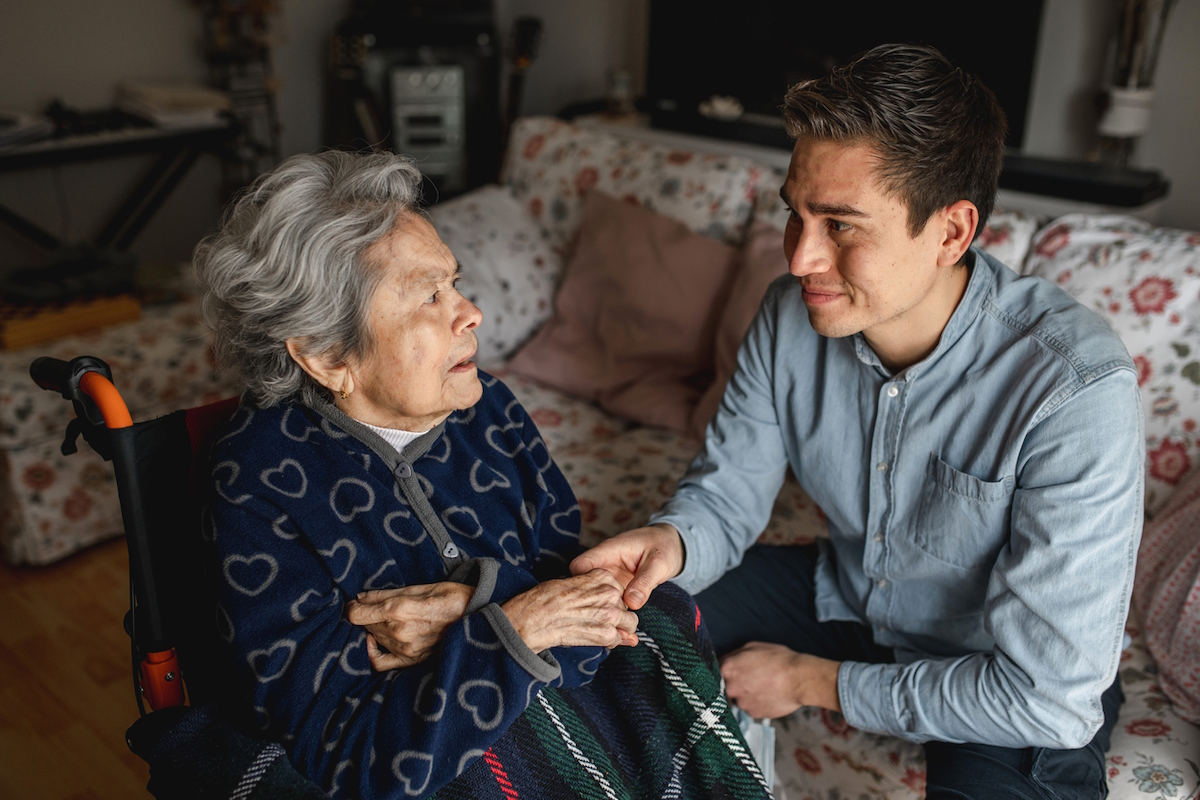As a caregiver for her aging father, Jessica* has been so focused on him that she often forgets and even shies away from seeking support for herself. After all, her dad needed constant care after his stroke last year. She felt like it would be selfish to think of herself—even if she felt exhausted, depressed, or facing health issues of her own. At least, that is what she explains to anyone who asks. However, the signs of caregiver stress and burnout have become too much for friends to ignore. Jessica’s mental, physical, and emotional health is important, too. As a result, they begin to wonder if there are caregiver support tools and programs available to help her thrive while she cares for her dad.
The short answer is yes. Approximately 40 million Americans provide unpaid care for aging adults—many of whom are a parent, spouse, sibling, or loved one. That statistic does not include paid caregivers and solo-agers who do not have family to lean on and can’t afford the luxury of having a paid caregiver. In total, more than 60% of caregivers experience one or more adverse mental or behavioral health symptoms, and many are hesitant to seek help.
Thankfully, caregiver support programs, tools, and other resources like the ones at The Senior Source are available to help caregivers like Jessica reduce stress at every phase of their caregiving journey.
Approximately 40 million Americans provide unpaid care for aging adults—many of whom are a parent, spouse, sibling, or loved one.
Are You Struggling With These Common Symptoms of Caregiver Stress?
- Emotional and physical exhaustion
- Feelings of hopelessness and helplessness
- Social withdrawal; lack of motivation
- Changes in sleep patterns
- Feelings of denial
- Depression and anxiety
- Changes in appetite or weight
- Irritability, frustration, anger, and other mood swings
- Lack of concentration
- New or worsening health problems
Understanding the Caregiver Role
A caregiver provides physical or psychological care for someone who needs support with daily activities due to being sick, elderly, or disabled. As previously stated, caregivers can be family members or friends. They can also be professionals in a facility—such as a nursing home or independent agency—or a solo-ager who must care for themselves despite any physical limitations. Caregivers help their loved ones live as comfortably and independently as possible by completing tasks such as bathing, dressing, grooming, toileting, managing medications, cooking, cleaning, health monitoring, emotional support, and transportation.

While it is easy to assume that caregivers are invincible, the reality is quite the opposite. The job is very demanding, and most caregivers devote much of their time, energy, and resources to what they do. This is when caregiver stress and burnout can quickly set in without the caregiver even realizing it. A few risk factors include:
- Being on call 24/7 with limited opportunities for breaks
- Not having anyone to relieve you when you are tired
- Too many responsibilities and obligations for one person to realistically handle
- Being thrust into a caregiver role unexpectedly
- Providing care for someone with difficult behaviors (aggression, confusion, etc.)
- Lack of skills and training
- Juggling a caregiver role with managing your own health issues
- Sharing a home with the person receiving care
- Serving as a caregiver for more than one person at the same time
Tools for Overcoming Caregiver Stress: 10 Tips
It is normal to be overcome by caregiver stress. This is especially true for individuals who find themselves in the unfamiliar position of providing care for aging loved ones or addressing their own needs as they age. The best way to combat these feelings is to proactively avoid or minimize the potential mental, physical, and emotional health risks they can cause. Caregivers like you need trusted resources to help you care for your loved ones well.

Below are a few caregiver support tips to consider:
1. Ask friends for help — Never be afraid to ask for help and delegate tasks, even if it is simply having a friend step in once or twice a week to run errands, cook a delicious and healthy meal, or give you an hour or two in the middle of the day to catch up on sleep or treat yourself to a spa day. More importantly, accept help when it is offered.
2. Talk to other caregivers — Many of us know someone who has previously played the role of caregiver. Even if we do not know someone personally, many caregiver support groups exist. Visit with these people regularly throughout your caregiving journey and pick their brains. What challenges and caregiver stress did they face, and how did they overcome it? Surround yourself with people who have been in your shoes before.
3. Talk through your feelings with someone in your inner circle — Make it a point to visit with a friend or family member in person or by phone to blow off steam and talk through some of your challenges. Even if that person has never been in your shoes, a listening ear and shoulder to cry on can do wonders for caregiver stress.
4. Establish a routine — A consistent daily routine provides structure and predictability for you as the caregiver and your aging loved one. At the same time, allow flexibility for unexpected events or changes in their condition.
5. Schedule “me” time — As selfish as it may feel to think of yourself when caring for someone else, it is critically important for your well-being and ability to continue providing uninterrupted care for them. Focus on activities you enjoy (reading, watching streaming shows, gardening, or thrift shopping). Regularly scheduling short breaks to catch up with friends and family on social media can help you recharge.

6. Take care of yourself — To piggyback on the previous tip, eat well, exercise, and get enough sleep. Try breathing techniques, muscle relaxation, and positive visualization to reduce stress and anxiety. If you have health issues of your own, stay on top of routine health check-ups and trips to the doctor when your body tells you something is wrong. The person you provide caregiver support for needs you to stay healthy and happy.
7. Learn more about caregiver resources — Beyond classes and support groups, meal delivery services may be available in your area to help lighten the load. The same can be said for house cleaning services and professional caregivers who can step in temporarily to handle your duties while you are away.
8. Take advantage of tech tools — There are apps available that can help you keep track of medications and doctor appointments. Equally as helpful are home monitoring devices and online support groups. Technology can be your personal assistant in the ever-growing world of caregiving. Need to schedule a doctor’s appointment? There’s an app for that. Struggling with grocery shopping? Delivery services are a click away. The list goes on. Technology can’t replace your love and presence, but it can be a powerful tool, a safety net that allows your loved one some independence while giving you the support you desperately need.
9. Stay informed — A huge piece of caregiver stress is the feeling that you are not trained to provide such services. This is where educating yourself is critical. Enroll in courses or workshops that teach caregiving skills and strategies, plus keep up with the latest information and best practices. Learn more about the condition your loved one is facing (stroke, Alzheimer’s, dementia, etc.) so that you know what to expect.
10. Be kind to yourself — Remember that you can’t control everything, and no one expects you to be the perfect caregiver. It is a tough job and feeling overwhelmed and unsure of what to do next is normal. Be open to changing your caregiver strategies if they aren’t working, use humor to alleviate stress, and practice gratitude.
More than 60% of caregivers experience one or more adverse mental or behavioral health symptoms, and many are hesitant to seek help.
The Senior Source Can Help with Caregiver Support Needs
As you care for an aging loved one, it’s important to remember that you are not alone. Older adults and their family caregivers can connect with organizations to get valuable information to help reduce caregiver stress on their caregiving journey. Our team provides referrals for services such as in-home care, assistance in moving an elderly parent locally from another state or city, hospice, housing (including independent living, assisted living, and nursing facilities), transportation resources, housekeeping services, legal services, end of life planning, and mental health services.
In addition, we conduct seminars and workshops to provide caregivers with vital resources and information. Our list of courses is growing by the day. When it comes to Dallas older adults, whether you are a family caregiver, a service provider, or a senior citizen, having a reliable resource is invaluable. The Senior Source in Dallas, Texas, is dedicated to supporting older adults and their caregivers.
The seniors and families we assist are diverse, as are our services. At The Senior Source, we prioritize providing high-quality, practical solutions to our clients, constantly focusing on growing our reach and impact within the community. While doing so, we maintain a positive and inclusive work environment for our employees, who are integral in continuously expanding our influence.
Embrace the future of aging with us. Contact us at 214-823-5700 or complete the contact form to learn about our services. We are here to assist you.
*Client names and/or photos may be changed to protect confidentiality.

